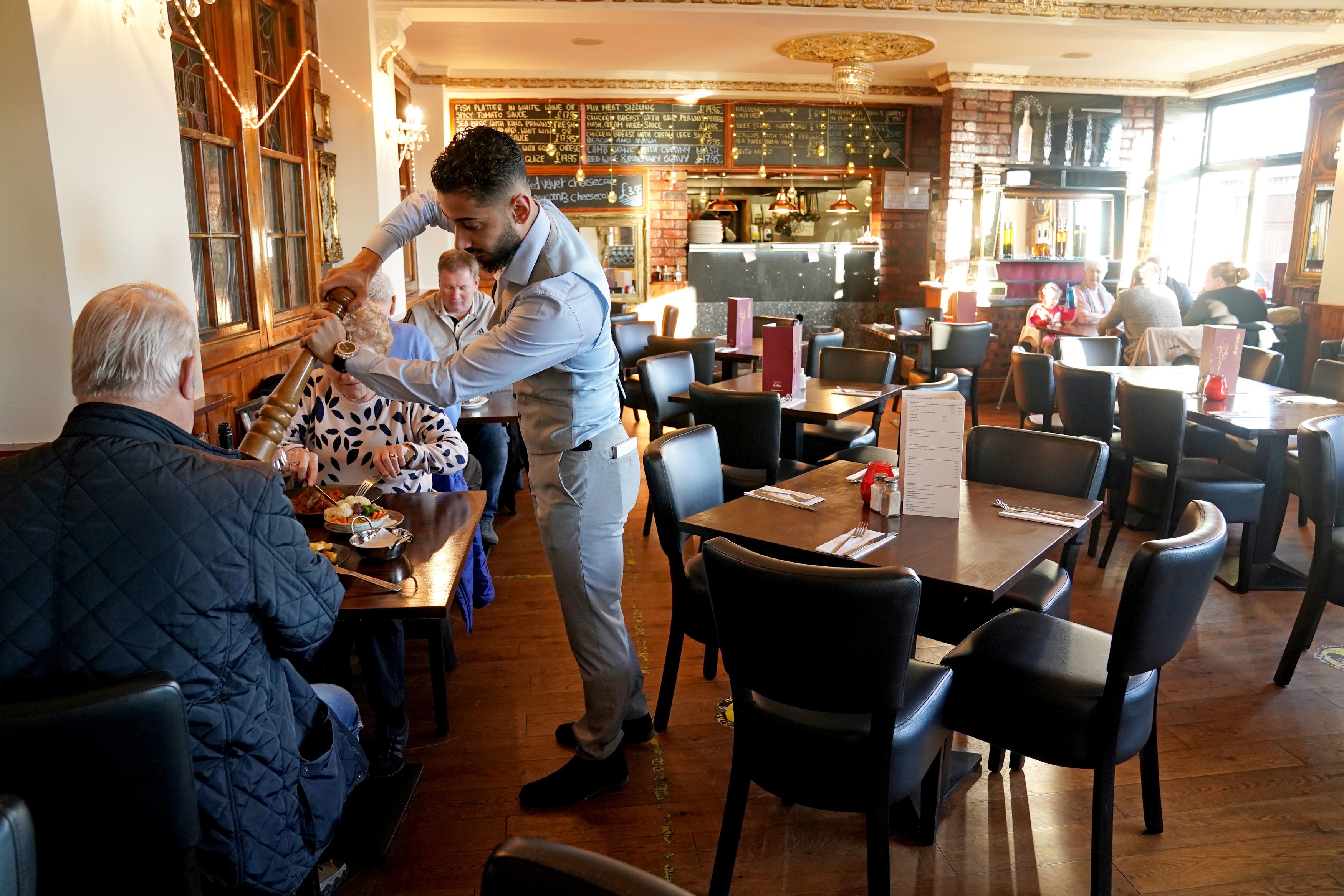How can hospitality recover from the labour shortage?
With the double whammy of Brexit and the pandemic, British pubs and restaurants are suffering acute labour shortages. James Moore explores how they can recover in the new year


Hospitality, which represents around 10 per cent of UK employment, is haemorrhaging its lifeblood right now – its people,” says Kate Nicholls, who ought to know. She is the boss of UK Hospitality, the industry’s vocal trade body.
Her organisation’s 740 corporate members operate 90,000 venues around the UK. Its statistics say that they generated £130bn of economic activity pre-Covid and employed 3.2 million people.
Trouble is, they’re finding it desperately hard to find new ones to add to that number.
The problem was writ large in the latest labour market data provided by the Office for National Statistics. It showed that unemployment fell to 4.2 per cent in October, representing about 1.4 million people. Job vacancies, meanwhile, stood at 1.2 million. All this despite the end of the government’s Job Retention Scheme.
“Labour shortages are at such an acute level that it is currently commonplace to see managers undertaking front-of-house duties, staff working longer shifts, and venues reducing trading days or menu options. Inevitably, this is taking its toll on revenues, too,” Nicholls says.
Revenues matter above all else to businesses. But if possible, they are doubly, trebly, important to this sector, which has been left reeling as a result of the UK’s stop-start lockdowns, imposed as a result of the pandemic.
There is frustration among businesses affected by labour shortages over what the government has, or hasn’t, had to say on the subject.
A spokesperson for the Department for Work and Pensions responds with this: “We are closely monitoring labour supply and working with sector leaders to understand how we can best ease particular pinch points, with similar challenges being faced by other countries around the world.

“In light of the increased transmissibility of Omicron, we have introduced daily contact testing to reduce pressures on workforces as a result of self-isolation, but are working with organisations to help them make preparations to mitigate the potential impact of increased infection.
“We also want to see employers make long-term investments in their workforce and our multibillion-pound Plan for Jobs is helping to support people across the country build new skills, secure work and progress.”
Investing in your labour force means boosting wages and improving training.

Nicholls insists that her members are doing these things. But she says it isn’t having the desired effect: “Wage hikes are being used to retain valued staff, despite the many other cost pressures and debts that most venues are facing. Unsurprisingly, confidence for the future is at a new low.”
These problems are, of course, not unique to the hospitality industry. They’re being felt across the labour market. The issue with lorry drivers has been perhaps the most well publicised, with leading companies like Tesco offering four-figure golden hellos. The agricultural sector has also regularly screamed blue murder.
Since the start of the Covid-19 crisis, the number of people dubbed ‘economically inactive’ – meaning that they’re not working or looking for work – has increased by 586,000
Rather less widely discussed have been the shortages that are now also hitting higher salary bracket occupations. The Report on Jobs published by KPMG and the Recruitment and Employment Confederation has been showing appointments to permanent roles hitting record highs. City firms have been boosting salaries just as UK Hospitality says its members have. There have been reports of turning work away.
Brexit is often raised as a major issue, at least by those willing to tell a hypersensitive government (on that topic and others) what it doesn’t want to hear. The inability to import labour from the continent is clearly playing a role in exacerbating the shortages.
Nicholls concedes that there will be no reforms to home secretary Priti Patel’s regressive immigration policies any time soon. However, she says: “We must streamline and reduce the cost of the sponsored, skilled visa route, which would allow more chefs to come here to work; and (government) should introduce short-term Covid recovery visas, enabling workers from overseas to fill UK roles quickly and more easily.”

This would clearly help. But while it might ease the situation a bit, it won’t fix it. Tapping into a vast pool of underexploited domestic labour might.
Last month the Resolution Foundation published “Begin again?” – the eighth report for the Economy 2030 Inquiry, a collaboration with the Centre for Economic Performance at the London School of Economics, which has been funded by the Nuffield Foundation.
It found that chancellor Rishi Sunak’s Job Retention Scheme – popularly known as furlough – worked. Produced at speed with help from the TUC and the CBI, it protected the UK economy from mass unemployment which might normally have been expected from an economic shock of historic proportions.
But at the same time, the pandemic was catalysing deep structural changes to the UK labour market, pushing people out of it.
Since the start of the Covid-19 crisis, the number of people dubbed “economically inactive” – meaning that they’re not working or looking for work – has increased by 586,000. Some 364,000 of them are of working age. This is a considerably larger number than estimates of the number of migrants who left the UK during the pandemic.

But why are they disappearing? Mike Brewer, Resolution’s chief economist, admits the lack of an answer to that question is a limitation of his report. “It probably won’t surprise you to hear someone like me saying that we need more research,” he admits candidly. But he says he can at least squash one potential reason.
“You would think virus related issues would be playing a role, but we didn’t find much evidence of that. It is not the case that people have left because of poor health over the last two years.
“What really matters for policy, and for the world at large, is what’s happening with older workers and why they are leaving the labour market in such numbers. If they are, say, affluent professionals who decide to retire early, then that’s maybe understandable.
“But if it is low skilled workers stopping work in their early fifties, which takes 10 or 15 years off their working lives, it’s going to result in them having much lower incomes in retirement. Then you have more of a social problem.
“We saw workers on furlough getting older and older through the pandemic. As the economy opened up, the younger ones went back. Those left on furlough were older workers.”

This has contributed to an employment gap between them and others. It isn’t the only such gap. They also affect workers from many minority ethnic groups, young unskilled men, and especially disabled people, for whom the gap is a chasm standing at just below 30 percentage points when employment rates of disabled people are compared with those of non-disabled people.
This is something that frustrates Stephen Timms, the chair of the parliamentary Work and Pensions Committee, who calls closing it a “central challenge for the next couple of years” and says the government should be trying to halve it. That was, under the Cameron administration, its stated policy, at least for a while.
Now the DWP talks airily about getting 1 million more disabled people into work. Critics question whether it really has a strategy when it comes to achieving that much less ambitious aim.
Employers also have to be all in on diversity. On any form of diversity, whether it is disability, ethnicity, gender; if they shut any one of these routes down they are going to be missing out
Timms says: “Something I feel quite strongly about is that delivering employment support to disabled people should be devolved to groups of local authorities working together with job centres, the health service. I don’t believe you can do this from Whitehall. It has to be organised locally.”
Involving local authorities could, Timms thinks, help employers tap into groups of workers who could perform roles they are struggling to fill.
“One great strength is that councils are not involved in benefits. So they’re not seen as the enemy. They are in a better place to be supportive and to help people through.”
Timms says this would, of course, have to be funded. Local authorities aren’t exactly flush with cash after more than a decade of austerity, with more cuts potentially looming. But given the scale of the labour crisis, that funding could be classified as an investment. Borrowing for investment is, as most economists would tell you, good borrowing.

As much as government could, and should, be doing more to address the labour market’s problems, employers are also starting to accept that they have work to do too.
Shortly after the economy opened up, the CBI looked at the labour market, concluding that, in contrast to the government’s view, the shortages are not a short-term issue.
Matthew Fell, director of policy, says: “We think it’s closer to a one-to-two year play affecting multiple parts of the economy and multiple skill levels. Experience is bearing this out.
“I think there is a combination of factors behind why the pool (of labour) has shrunk; people have been choosing to retire early, plus there’s Brexit and Covid. Government has washed its hands and opportunistically said, ‘this is the plan’ and it’s driving up wages. That, in the short term, is true but without a deep seated plan for how to retrain and re-skill people it’s storing up problems.”
Not least of which is inflation, currently running at more than 5 per cent, which will eat into the value of any wage rises.
“We feel a combination of better targeting of skills funding and a more agile approach to training plus a more responsive (to the needs of industry) Immigration Advisory Committee would make for a less bumpy journey,” says Fell.
However, he says business has the bigger job: “Employers do need to look at how we tackle underused parts of the labour market. There are four buckets we think businesses should lean into. Number one is to make sure they leave no stone unturned. Secondly, there’s pay and conditions. Pay is the easier thing to fix but with, say, HGV drivers, the issue has been about conditions as much as pay. Thirdly, if they’re not making a good play on hybrid working, remote working, flexible working, they’re missing a trick.

“Employers also have to be all in on diversity. On any form of diversity, whether it is disability, ethnicity, gender; if they shut any one of these routes down they’re going to be missing out.
“The reality is that when you say this everyone sort of nods and says yes, but the hard truth is not everybody is doing all of these things all of the time. We, as employers, are not good at all parts.”
A survey commissioned by the recruiter Page Group bears this out. It found nearly a quarter of managers would not recruit a disabled person.
Fell also urges employees to shake free of their reluctance to invest in skills and training, where the UK has historically underperformed. He says the money spent on this sits at about half the EU average.
“Too many employers still see this as a cost they may not benefit from if employees leave. They need to see it as an investment that they will gain from. Because they will.

“In a nutshell, this is ultimately for business to fix. And it is fixable. But there are also things government could do.”
The TUC says it is important that employers don’t forget about pay. Ditto conditions. While labour shortages have driven wages up in some sectors, it’s far from universal.
In fact, an analysis of official statistics that the union body conducted earlier this month revealed real wages, adjusted for the cost of living, were in December 2021 on course to be 0.8 per cent lower than in September 2021. The main cause: inflation, which hit 5.2 per cent in the year to November.
Kate Bell, the TUC’s chief economist, says some of the labour market’s problems pre-dated the pandemic.
By providing a variety of ways of working, employers can better match the preferences of workers. I think there is a big unmet demand for more flexible working
“If you look at the issue of pay, we’ve only just got back to where we were before the financial crisis. There is still an awful lot of insecure work; people on zero hours contracts, agency work and so on. There was an expectation that we’d start to see practices like that falling by the wayside as a result of labour shortages. It isn’t happening.”
This sort of insecure work is neither helpful, nor attractive to, some of the groups suffering from employment gaps. Disabled people, for example, tend to prefer the security of employers who recognise their value. They don’t job swap to the same degree as their able-bodied colleagues. Insecure work doesn’t work for them.
Bell also highlights the resistance to Britain’s insecure work felt by older workers and departing European citizens: “You can see why, when faced with stagnating pay and conditions, you might think twice about whether the labour market is something you want to return to. Let’s say you were a European citizen and you moved back. Look at areas like poultry processing where you’re working in a cold warehouse on a zero hours contract for a job that is skilled but might not offer opportunities for progression. You might think, I’m not sure this is what I want to come back to.”
Bell notes that there have been pockets of improvement, where pay has risen and conditions have improved. These, she argues, are often in places that have strong unions.
“Of course I’m a trade unionist, so you’d expect me to say that,” Bell states with commendable honesty. But it’s fair to say the Bank of England has picked up on this too. Former chief economist Andy Haldane made the point in a 2018 speech. Other Threadneedle Street economists have published papers saying the same.
Bell also criticises the government for its persistent failure to come forward with a long-promised employment bill, which seems to have got lost in the long grass of Whitehall.
While it might not fix the labour market, if it addressed issues such as workers rights, insecure labour, zero hours contracts, it could help because these are clearly playing a role in putting underutilised groups off.

A contrarian view on all this comes from Jonathon Boys, labour market economist at the Chartered Institute of Personnel and Development.
Boys argues that overall work has become more secure over the last decade. “Not just the amount of work but the quality. This was all driven by the ever-tighter labour market,” he says.
Boys also argues that the disability employment gap has closed with the rate of employment growing faster than that of the overall workforce.
He says one reason for the problems the UK is currently experiencing is that furlough was so successful. “Employers had a contingent workforce of furloughed workers ready to come in at the drop of a hat. When something changed, such as pubs reopening, this workforce would come back online. That’s a lot of flexibility to meet demand. But the flexibility has now all gone.”
He questions how much influence policymakers can have in the short term: “The driver for work becoming more secure was the ever-tighter labour market. But what policy lever do you pull to keep the labour market tight? Run the economy hot? How do you do that?”
He does note a strong desire for more flexible working that employers may not be satisfying. “By providing a variety of ways of working employers can better match the preferences of workers. I think there is a big unmet demand for more flexible working.”
And he doesn’t deny that long term, there are policy levers that can be pulled to improve the situation, such as improving skills and encouraging training. Fell says that employers are ultimately “going to have to work harder” to address these challenges.
Pope would argue, and the figures would suggest, they’re not there yet.
Join our commenting forum
Join thought-provoking conversations, follow other Independent readers and see their replies
Comments



Bookmark popover
Removed from bookmarks